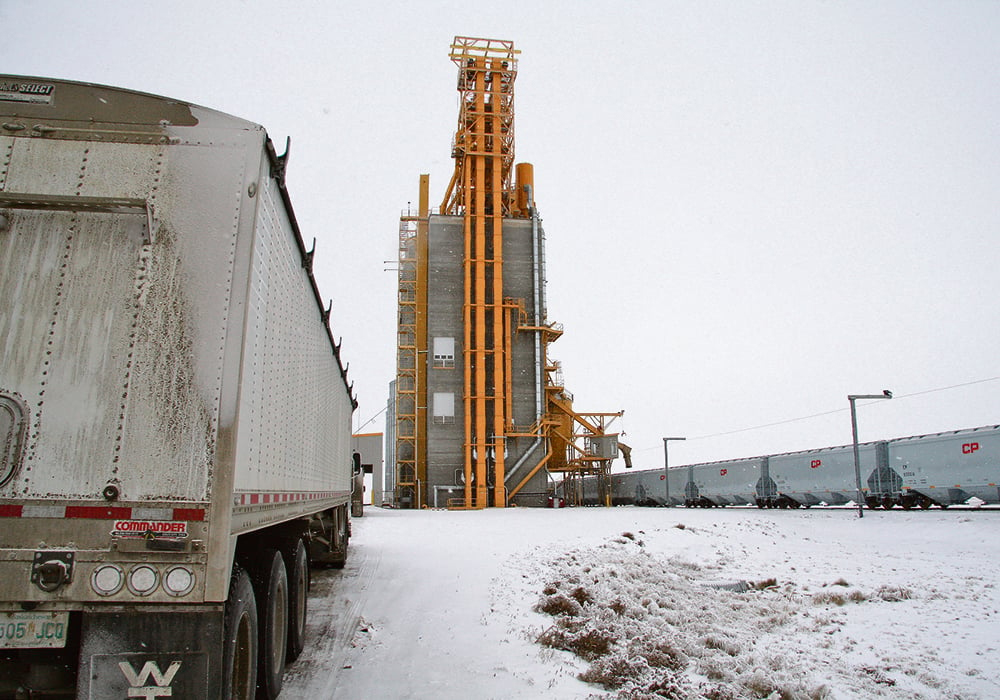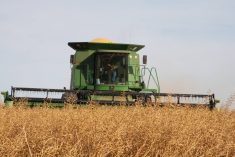Railways blame their struggles to provide enough cars on cold weather and new labour rules that require more workers
SASKATOON — Grain companies say rail service has dropped off tremendously since January.
Railways did an excellent job moving crops in the fall, but their performance took a turn for the worse when the weather turned cold.
“From then we’ve seen the railways struggle with manpower and power,” Jarrett Beatty, a canola exporter with Parrish & Heimbecker, said during the Canola Council of Canada’s Canola Utilization Forum.
The supply of rail cars has dropped off significantly.
“That’s causing a bit of a drag on the system right now,” he said.
Read Also

Bunge’s crop mix is changing
Bunge has predominantly been a soybean processing firm, but that’s about to change after the merger with Viterra with softseed processing and grain merchandising gaining ground.
Jeff Pleskach, a trader with Cargill, echoed those concerns.
“(There are) monstrous challenges with respect to rail movement right now, even through a fairly mild winter,” he said.
“It has been frustrating for a lot of members in the industry.”
Canadian National Railway said it achieved a record in bulk grain delivery in February but a series of compounding events, including a period of cold weather, disrupted the fluidity of its western Canadian grain movement at the start of March.
“Additionally, operational issues outside of CN’s control in the Vancouver area have adversely affected CN network productivity and have resulted in additional operating crew workload,” the company said in an email.
There have also been labour problems. New federal rest period rules for conductors and engineers came into effect on May 25, 2023. The rules reduce the average number of trips per employee.
“These changes follow December 2022 regulatory changes concerning the number of paid sick days and personal leave days for workers in all federally regulated private sector workplaces,” stated CN.
One CN union has interpreted those new regulated days off as stackable, or in addition to the existing terms of their collective agreement.
“The changes to work rest rules, paid sick days and personal leave days have all had an impact on the availability (percentage of crew working or available) of conductors and engineers on any given day across CN’s Canadian network,” said the company.
“CN estimates the federal changes require hundreds of additional employees to do the same amount of work as before the regulations were implemented.”
The company is attempting to aggressively recruit and train new employees in an environment where unemployment levels are at their lowest levels in decades.
“Despite the intense recruiting and training CN implemented in advance of the regulatory changes, CN experienced labour shortages at times in parts of British Columbia and the western Prairies during February 2024,” stated the railway.
“We are actively working to address these challenges and improve the fluidity of our operations.”
Canadian Pacific Kansas City (CPKC) said that during the first five months of the 2023-24 crop year, low demand for grain shipments left rail capacity unused for substantial periods.
“Since January, CPKC has effectively adjusted operations to handle increasing volumes, which are now substantially exceeding customer forecasts,” the company said in an email.
“During this period, the supply chain has been impacted by a number of factors, including rapid swings in demand, extreme cold in mid-January disrupting the entire grain supply chain, a track outage in February on our mainline corridor between Calgary and Vancouver, delays on the Vancouver North Shore and grain loading delays at the Port of Vancouver due to rain.”
Mark Hemmes, president of Quorum Corp., which is Canada’s grain monitor, said there is no doubt rail service has tailed off.
“What we’re seeing right now is we’ve got a vessel lineup out in the West Coast that is growing to a level that has us very concerned,” he said.
There were 37 vessels waiting to be loaded as of March 20 and more scheduled to arrive in the coming days and weeks.
“We’re not seeing unload numbers that will sufficiently supply product for those vessels that are there nor the ones that are arriving.”
He is starting to worry about the lineup coming to Thunder Bay, Ont., as well with the opening of the St. Lawrence Seaway on March 22.
CN and CPKC supplied a combined 70 per cent of hopper cars ordered in grain week 33, up from 56 per cent the previous week, according to the Ag Transport Coalition’s latest report.
That is down from well above 90 per cent during weeks 12 to 24.
“That’s a little bit disconcerting,” said Hemmes.
“All of the indicators are there that would point to an issue that exists with rail service.”
















